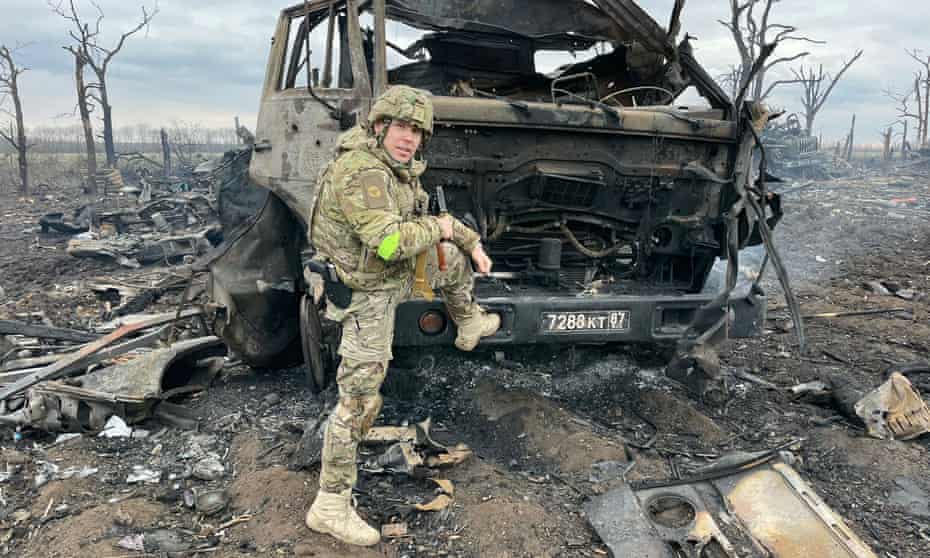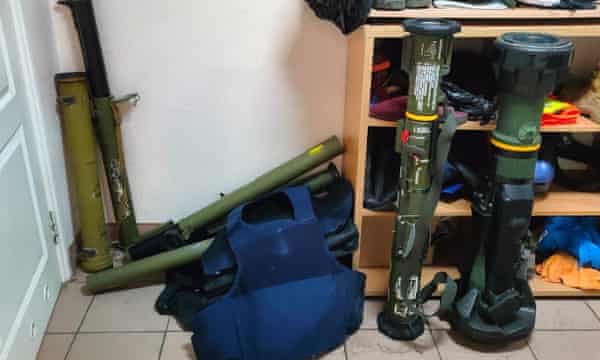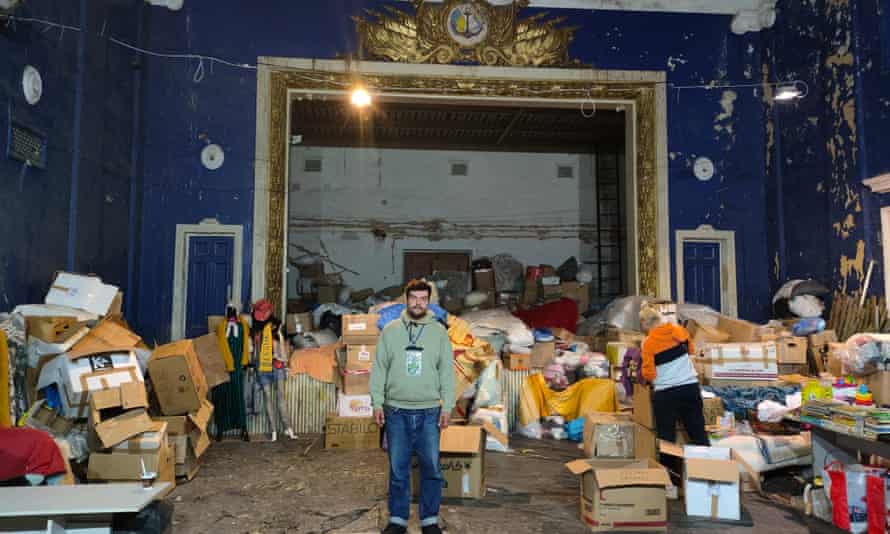‘The west can change the outcome’: plea for heavy weapons on Ukraine frontline

Roman Kostenko, a Ukrainian MP and special forces commander: ‘Victory now depends on our international friends.’
People under constant fire in southern city of Mykolaiv say they can beat Russia with more help
Astack of deadly weapons line the corridor next to Roman Kostenko’s office in the southern Ukrainian city of Mykolaiv. Giant tube-like Javelin missiles and a powerful-looking green cylinder. “That’s an NLAW anti-tank weapon supplied by Britain,” Kostenko – a member of Ukraine’s parliament and a special forces commander – explained. “We’ve used it.”
When Russia invaded on 24 February, Kostenko was in Kyiv. He swapped his politician’s outfit of suit and tie for a uniform and hurried to Mykolaiv on the southern frontline. By this point Russian troops had practically encircled the city and its port on the Bug River. They had seized Mykolaiv’s airport and were advancing from the north-east. “I was the last car in,” he said.
Citizens were piling up tyres and making molotov cocktails in preparation for street-to-street fighting. The Ukrainian army, however, managed to push the Russians back. Kostenko showed off a video he took of a Russian position on Mykolaiv’s outskirts. There were bodies of enemy soldiers killed in a Ukrainian artillery strike, as well as abandoned field guns and vehicles.

Since this failed incursion the fighting has turned into a “war of rockets and artillery”, Kostenko said. The frontline in the south runs approximately along the administrative border between Russian-occupied Kherson oblast and Mykolaiv, 12 miles (20km) to the north. It is a shimmering landscape of green wheat fields and steppe villages, now under constant fire.
Russian howitzers are able to target Mykolaiv with ease. On Saturday a missile smashed into a residential block in the city, killing one person and injuring seven. The Ukrainians lack long-range rocket systems that would enable them to fire back, as well as defensive anti-aircraft batteries, Kostenko said. In the meantime they sit in makeshift trenches under fire.
“To survive artillery hitting you 24/7 is very hard,” Kostenko added. The Javelins sent by the US were ineffective because the Russians hid their armoured vehicles in a network of Soviet-era irrigation canals, he explained. “Our anti-tank weapons don’t see them. If our partners give us heavy artillery and advanced systems like MRLS [multiple-launch rocket systems] we can win and take back occupied territory.”
For now, Ukrainian soldiers are only able to make local tactical gains. On Monday they retook a village in north-east Kherson. Kostenko said Russia had plenty of tanks and supplies of ammunition left. The fighting in the south, and in the east where a battle is raging for the city of Sievierodonetsk, resembled the second world war with modern weapons, he said. The Russians, he admitted, had the advantage.
The MP, secretary of the national security, defence and intelligence committee, spent 15 years as a soldier. He was wounded twice in late 2014 while fighting at the airport in Donetsk against the Russians and their separatist proxies. He grew up in a village outside Kherson now controlled by Moscow, where Russian soldiers broke into his parents’ house, looted his parade uniform and took away all of the furniture, he said.
Kostenko suggested Vladimir Putin’s goal was to seize the Donbas and annex Ukraine’s Black Sea coast, making it a “non-sea country”, after he had failed in his original goal of toppling Kyiv’s government to return Ukraine to Russian influence and to demonstrate Moscow’s military invincibility.
A member of the liberal pro-European Golos party, he praised the UK, US and Poland: “We love Boris Johnson. Britain is a country which has clearly stated its position. It stands by its values. It is not afraid of the Russia Federation. We have several British volunteers who are fighting with us. The whole civilised world is fighting Russia, not just Ukraine.”
He was less enthusiastic about Germany and France. “Some of our partners are behaving very cautiously. It’s inexplicable. They are not calling out the enemy. We are fighting totalitarianism,” an exasperated Kostenko said.
Mykolaiv’s inhabitants, meanwhile, have got used to thunderous booms, which shake the city on an hourly basis. For more than a month there was no water after a pipeline was destroyed. Last week a supply for washing was finally reconnected. There is no drinking water. It is delivered to the city, a major shipbuilding centre in USSR times, in large plastic bottles. About 40% of its population have left.
A humanitarian aid point has been set up in a crumbling 200-year-old theatre and concert hall once used by naval officers. There are supplies of clothes, shoes and medicines. Residents fill in a form explaining what they need. Viktoria Veselovska, a journalist working in a pop-up basement pharmacy, said she had no mosquito repellant. “Insects are a big problem for our soldiers,” she said.

Morale among those who have decided to remain in shell-battered Mykolaiv appears high. Olga Pidsosonna, a volunteer and major in the port’s customs department, described the war as “one very long bad day”. “Russia is trying to eat us. But it will break its teeth. We are a very strong nation. I’m proud to be Ukrainian and I’m proud of our army and our volunteers,” she said.
In peacetime 10 cargo ships a day would leave Mykolaiv’s harbour, she said. Most exported grain. Russia’s naval blockade of the Black Sea meant the port was inoperative. A Ukrainian victory should include Crimea, “stolen by the Kremlin in 2014”, Pidsosonna said, adding: “I have relatives in Crimea. They want to be back with Ukraine. They can’t say this openly, of course. They are afraid.”
Few people in this city of half a million expected to find themselves living in an old-school war zone. One person not surprised by how 2022 turned out was Makar Kostiuk, a student from Vladivostok. Kostiuk volunteered in the local office of the Russian opposition leader, Alexei Navalny. He left the country for Ukraine before Navalny was arrested and jailed.
“When the bombs started falling I was working on my second novel. The explosions made me type faster,” Kostiuk said. Shrapnel landed in his courtyard, punching a hole in the glass on the stairwell. Kostiuk said he had not encountered any anti-Russian prejudice. But his bank cards had been blocked and he was likely to have to leave Ukraine in the summer when his residency permit ran out.
Many shops on Mykolaiv’s main street, Sobornaya, were boarded up. Tinned music played from loudspeakers attached to maple trees. A few people were out shopping and a man in Lycra rode past on his mountain bike. A lot of destruction was visible. An airdropped bomb had flattened the Ingul hotel. In March the Russians fired a cruise missile at the regional administration building, killing 12 and wounding 33.
Nobody knows when the Ukrainian army will be able to take back Kherson, which was overrun in the first days of the invasion. The Kremlin says the area now belongs to Russia. It recently prohibited residents from fleeing and has mined the road leading to Mykolaiv. Plans to hold a “referendum” on joining Moscow have been put on hold because of a lack of public support. “Ninety-nine per cent of the country does not want Russia,” the MP said.
Kostenko gave the Guardian a souvenir: a jagged fragment from a Russian Kalibr warhead, which he wrapped up carefully in kitchen roll. “Victory now depends on our international friends,” he said. “We have plenty of kalashnikovs and machine guns. If we get enough heavy arms Russia will not be able to go any further.” He stressed: “The west can change the outcome of this war.”


No comments:
Post a Comment
Note: only a member of this blog may post a comment.